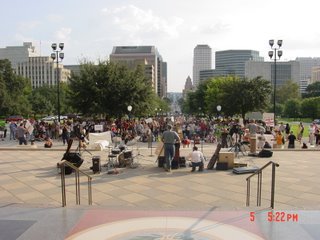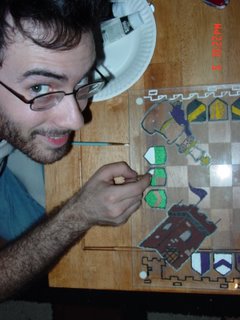Euphemisms
Extropy/syntropy/negentropy are three terms that mean essentially the same thing: the opposite of entropy. Entropy is the running down of systems due to loss of heat and other energy. Spin a coin on a table top and watch how it goes slower and slower until it finally falls flat. Release a weight on a string tied to a fixed point, and watch as over time the pendulum motion ceases. Light a candle and wait until it has burned off all the wax and fizzles out. In all of these cases, energy is lost from the system and the system itself finally breaks down. A sad state of affairs, and one of those tendencies of matter and energy. The universe itself is supposedly not immune to this.
Fortunately for us, there are some spots of the universe where energy is being added into a system. When that coin is spinning on the table, see if you can't deftly give it a little push and make it stay up longer. Nudge that weight on the string and keep the oscillating motion going. Add more wax to the candle to keep it lit. The Earth as a system receives more energy than it emits. It is a little pocket of negentropy.
Syntropy and entropy are words we use to describe what happens. They do not change reality in any way. But the concepts themselves are very compelling. I have often wondered if there was some universal morality that would apply in almost all cases. Good and evil, heaven and hell, right or wrong don't amount to much in terms of dualities. They are subjective and artificial. Entropy and syntropy are not. They are real phenomenon with measureable effects. In a strange way, they can also function as morality.
When I was younger, I thought it was fun to break extra bricks and path stones we had lying around in the backyard. My father got mad at me and asked me "Why do you feel the need to destroy things?" It was then that I realized it is easier to destroy something than it is to create. That is, it would take far less energy to destroy something compared to what it took to make it. Destruction is easy. Creation is hard. We hate war and violence because it is destruction; we enjoy art because it is creation. We attach many positive connotations with building and growing and improving, and many negative connotations with decay and instability and fatigue. It seems there is something built into us that makes us see creation as beautiful and desireable, and destruction as being ugly and repulsive.
In our actions and deeds, entropy and syntropy can be moral compasses. An act which leads to death and destruction is to be avoided; a deed which leads to expansion and development is to be preferred. I realize these are broad concepts, and some of them can be counter to the premise, or contradictory to nature. Constructing a large parkinglot over what was once old growth forest is not necessarily a desired outcome (although, one could argue that more energy went into making those trees than into cutting them down and laying pavement, so this act was a net loss of energy). Also, if we did not engage in some sort of destruction of other organisms, we would starve and fizzle out much like that candle. This can be viewed differently: we need to survive at the expense of other systems, but the kind of systems we consume can mean the difference between net gain and net loss of energy (see: Vegetarianism). The point is that, in a broad sense, what we do can be judged by how much we contribute compared to how much we take. Give more than you take. If you don't like giving, take less until what you are giving is adding energy to the system.
Extropy has a slightly different meaning than the other two, more synonymous terms. It is defined as the extent of a living or organizational system's intelligence, functional order, vitality, energy, life, experience, and capacity and drive for improvement and growth. That last item in that definition offers us something that no other duality morality could ever provide: a goal. Right and good are certainly considered goals, but they are not defined, and we have no objective way to measure our progress. Heaven as a concept is almost entirely meaningless. With extropy we have a fixed star, a set point, a destination, a purpose - to increase extropy. We can measure it, we can see it unfolding before our eyes. We can apply to ourselves as individuals, or to society, or any other system.
Fortunately for us, there are some spots of the universe where energy is being added into a system. When that coin is spinning on the table, see if you can't deftly give it a little push and make it stay up longer. Nudge that weight on the string and keep the oscillating motion going. Add more wax to the candle to keep it lit. The Earth as a system receives more energy than it emits. It is a little pocket of negentropy.
Syntropy and entropy are words we use to describe what happens. They do not change reality in any way. But the concepts themselves are very compelling. I have often wondered if there was some universal morality that would apply in almost all cases. Good and evil, heaven and hell, right or wrong don't amount to much in terms of dualities. They are subjective and artificial. Entropy and syntropy are not. They are real phenomenon with measureable effects. In a strange way, they can also function as morality.
When I was younger, I thought it was fun to break extra bricks and path stones we had lying around in the backyard. My father got mad at me and asked me "Why do you feel the need to destroy things?" It was then that I realized it is easier to destroy something than it is to create. That is, it would take far less energy to destroy something compared to what it took to make it. Destruction is easy. Creation is hard. We hate war and violence because it is destruction; we enjoy art because it is creation. We attach many positive connotations with building and growing and improving, and many negative connotations with decay and instability and fatigue. It seems there is something built into us that makes us see creation as beautiful and desireable, and destruction as being ugly and repulsive.
In our actions and deeds, entropy and syntropy can be moral compasses. An act which leads to death and destruction is to be avoided; a deed which leads to expansion and development is to be preferred. I realize these are broad concepts, and some of them can be counter to the premise, or contradictory to nature. Constructing a large parkinglot over what was once old growth forest is not necessarily a desired outcome (although, one could argue that more energy went into making those trees than into cutting them down and laying pavement, so this act was a net loss of energy). Also, if we did not engage in some sort of destruction of other organisms, we would starve and fizzle out much like that candle. This can be viewed differently: we need to survive at the expense of other systems, but the kind of systems we consume can mean the difference between net gain and net loss of energy (see: Vegetarianism). The point is that, in a broad sense, what we do can be judged by how much we contribute compared to how much we take. Give more than you take. If you don't like giving, take less until what you are giving is adding energy to the system.
Extropy has a slightly different meaning than the other two, more synonymous terms. It is defined as the extent of a living or organizational system's intelligence, functional order, vitality, energy, life, experience, and capacity and drive for improvement and growth. That last item in that definition offers us something that no other duality morality could ever provide: a goal. Right and good are certainly considered goals, but they are not defined, and we have no objective way to measure our progress. Heaven as a concept is almost entirely meaningless. With extropy we have a fixed star, a set point, a destination, a purpose - to increase extropy. We can measure it, we can see it unfolding before our eyes. We can apply to ourselves as individuals, or to society, or any other system.



















